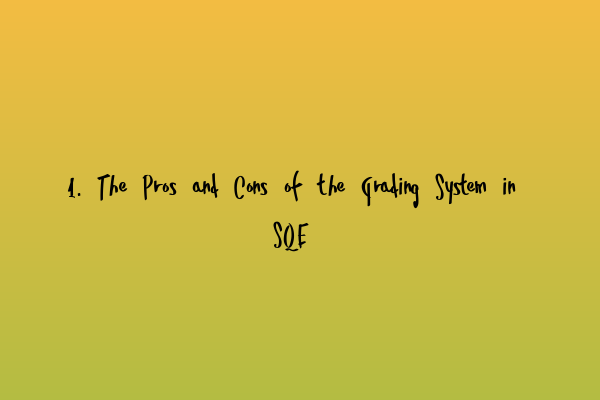The Pros and Cons of the Grading System in SQE
The Solicitors Qualifying Examination (SQE) is a comprehensive assessment that all aspiring solicitors in England and Wales must pass in order to qualify. One important aspect of the SQE is its grading system, which determines the level of achievement for each candidate. In this article, we will explore the pros and cons of the grading system in the SQE, shedding light on its benefits and potential drawbacks.
Pros of the Grading System
The grading system in the SQE has several advantages that contribute to a fair and reliable assessment process. Here are some of the key benefits:
1. Transparent Evaluation
The grading system provides candidates with a clear understanding of their performance and allows them to gauge their strengths and weaknesses. By knowing their grade, candidates can assess their progress and areas that require improvement, helping them refine their study strategies and focus on specific topics.
Related Article: Grading System in SQE: Understanding How Exams are Evaluated
2. Fairness and Consistency
The grading system ensures fairness and consistency in evaluating candidates’ performance. The use of standardized criteria and marking schemes helps eliminate subjective bias, ensuring that every candidate is assessed based on the same standards. This promotes a level playing field and increases the credibility of the examination process.
3. Motivation and Recognition
The grading system motivates candidates to strive for excellence by rewarding their accomplishments. Achieving a high grade in the SQE can serve as a source of pride and recognition for candidates, motivating them to continue their legal careers with confidence and enthusiasm.
Cons of the Grading System
While the grading system in the SQE offers numerous benefits, it is essential to consider its potential drawbacks to gain a comprehensive understanding of its implications. Here are a few cons to consider:
1. Limited Differentiation
The grading system may not provide a nuanced differentiation between candidates of varying abilities. For instance, candidates with similar grades may possess different levels of knowledge and skills. This lack of differentiation may impact the ability of employers to identify the most qualified candidates for specific positions.
2. Performance Pressure
The grading system can create high levels of performance pressure on candidates. The focus on achieving a specific grade may lead to increased stress and anxiety, potentially affecting the mental well-being of candidates. Striking a balance between encouraging excellence and mitigating undue pressure is crucial for a healthy examination environment.
Related Article: Time Management for SQE: Strategies for Efficient Study Planning
3. Potential Misinterpretation
There is a risk of misinterpretation of grades by employers or other stakeholders who may not fully understand the grading system. Employers may rely heavily on grades as a sole indicator of a candidate’s abilities, potentially overlooking other important factors such as practical skills, work experience, and personal attributes.
Conclusion
The grading system in the SQE comes with its own set of advantages and disadvantages. While it offers transparency, fairness, and motivation, it might lack the nuance required for precise differentiation and could create undue performance pressure. To fully recognize and leverage the benefits of the grading system, it is important to consider it as part of a holistic evaluation process, complemented by other factors such as practical assessments and personal interviews.
Related Articles:
